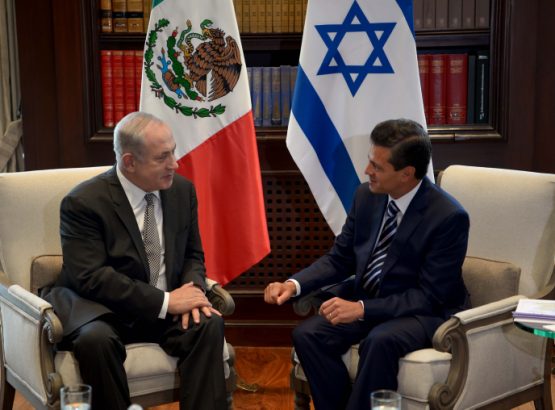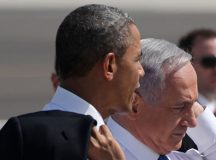There is a fundamental assumption undergirding the argument that people like me make about Israel needing to come to an arrangement with the Palestinians, which is that Israel’s foreign relations will remain stagnant until Israel is seen as being serious about a two-state solution. This is the prime motivation behind calls for Israel to engage with the Saudi-led Arab Peace Initiative and to accept it in principle with reservations, or for Israel to freeze construction east of the security barrier, or for Israel to renounce claims to territory that will be designated for a future Palestinian state. In the absence of meaningful negotiations that have a legitimate chance at a successful conclusion, the theory is that Israel should take other steps that will prove its good faith efforts to get to a deal in the future and its geopolitical standing will improve.
This argument applies universally, but often focuses more narrowly on Israel’s relations with neighbouring Arab states. Proponents of this view – me included – point to Israel’s longstanding regional isolation and its chilly peace with Egypt and Jordan, and conclude that this situation will never be ameliorated until the Palestinian issue is resolved. Whether or not Arab leaders actually care about the plight of the Palestinians is beside the point; the fact is that Arab publics do, making it a politically potent issue that carries great risks for Arab governments that are seen as engaging with Israel and throwing the Palestinians under the bus. Shared interests, common security threats, and obvious economic benefits to open and greater engagement with Israel are not enough to override this basic domestic political reality, and thus Israel will be stymied until there is progress on the Palestinian front.
On the other side of this debate are those – most prominently Prime Minister Benjamin Netanyahu – who argue that the world has changed and that progress with the Palestinians is not a prerequisite for Israel’s integration into the Middle East. There is no question that Israel’s security relationships with many Arab states are robust and that cooperation behind the scenes is at an all-time high, and the prevalent argument is that open and public engagement is bound to follow. Netanyahu has often proclaimed anti-Israel activity at the UN as the last gasps of a dying world that has given way to a new one, and he touts events like Indian Prime Minister Narendra Modi’s visit to Israel or his own visits to African states as evidence that the shifting tide will soon envelop Israel’s own region. In this line of thinking, the Palestinian issue has always been of secondary importance to Arab states. The shared goal of countering Iran, along with Israel’s technological and economic might, is too overwhelming to be sacrificed at the altar of a decades-old and unresolved minor regional conflict involving Israel and a third party.
The evidence siding with the first side of this debate has always been robust. Israel’s improved standing with countries like China and India has not prevented them from repeatedly voting against Israel and in solidarity with the Palestinians at the UN. Its covert chumminess with Arab states has not led any of them to recognise Israel or establish formal diplomatic or economic relations. The world has voted overwhelmingly to accept the Palestinian Authority into international institutions over Israel’s objections, including just yesterday when Interpol voted to accept Palestine as a member state in a vote that was not close (75 in favour, 24 against, 34 abstaining). It does not appear as if the diplomatic ceiling that Israel constantly bumps up against has been shattered, let alone cracked, and the obvious variable to shift this dynamic remains progress on getting to two states.
So what to make of a recent spate of data points that put this argument in doubt? There have been the public optics, such as the meeting – with released publicity photographs! – between Netanyahu and Egyptian President Abdel Fattah al-Sisi at the opening of the UN General Assembly last week, and then the unconfirmed rumours of Saudi Crown Prince Mohammed Bin Salman and Qatari Emir Tamim bin Hamad al-Thani making secret trips to Israel this month. More concretely, there were reports this week that Israel and Bahrain are on the cusp of normalising relations as a result of their shared opposition to Iran – precisely what Netanyahu and others have argued will happen. All of this is coming in the face of stasis in Israeli-Palestinian negotiations, but even more significantly amidst a hardening of Netanyahu’s public statements against two states and increasing calls from the Israeli right to annex the West Bank in part or in whole. Is the argument that progress with the Palestinians is the key to progress with the rest of the world crumbling precisely in the way that its detractors have predicted?
For starters, the flood of alleged revelations over the past month is wildly overblown. Neither the Saudi crown prince nor the Qatari emir could visit Israel without being noticed in a country where people track the Netanyahu family dog Kaya’s bowel movements in real time. Despite Israel’s outreach to Saudi Arabia, normalised relations are nowhere on the horizon. This goes even more so for Bahrain, which unlike Saudi Arabia is too small to take the risk of being a vanguard that other countries will follow. Bahrain also cannot afford to further alienate its public by establishing relations with Israel unconnected to what is going on with the Palestinians after its particularly violent response to Bahrainis demonstrating during the Arab Spring. Saudi Arabia and Bahrain have spent over a decade cultivating private ties with Israel while being unwilling to follow up in public beyond allowing officials to be in the same room with Israelis, and this is only more of the same.
But more importantly, the argument about better relations with the Arab world being tied to the Palestinians is actually a distraction from a bigger issue. The larger point that gets elided is that it is Israel’s relations with the West that are also dependent on the Palestinian issue. One of the great ironies is that the countries that publicly claim to be the most concerned about the Palestinians – Arab states – are the ones most immune to any downgrading with Israel, while the ones that have the strongest public relationships with Israel – European states – are the ones most vulnerable to rupture due to developments in the West Bank or Gaza.
No matter what Israel does, security cooperation with Saudi Arabia will continue. The same goes for coordination with Egypt over fighting jihadis in the Sinai, and intelligence sharing with Jordan. What happens with the Palestinians make little to no difference in maintaining these current relationships, leaving aside the public aspect of them that Israel would like to see grow. When the entirety of a bilateral relationship takes place behind closed doors, this private and undisclosed activity is not put at risk by anything going on out in the open. It is in places like the UK, Germany, and to a lesser extent the US that Israel needs to be worried about its relationships over the longer term should nothing change on the Palestinian front.
As populism becomes an even more potent political force in Western democracies and sympathy for the Palestinians takes deeper root, it is Israel’s public relations that are subject to risk. That is not to suggest that any of these states will ever break ties with Israel, but they are also not subject to the same threat or trade calculus that Israel’s Arab neighbours are, which makes them more vulnerable to the way optics impact public opinion. Because these democracies do not share a similar threat level from Iran with Israel that a state like Saudi Arabia does, and because they will not benefit from buying Israeli natural gas the way a state like Jordan does, Israel’s public actions impact the foundations of their bilateral ties in a more fundamental way. It is because Israel has such robust and valuable traditional diplomatic relations with its Western allies that it needs to worry about the things it does that adversely affect the ability to maintain such traditional relationships.
Netanyahu has dreams of walking down the streets in Riyadh and Dubai, but he should be keeping an eye on the streets of Paris and Madrid. There is scant evidence that the diplomatic breakthroughs that he wishes to achieve with Arab states will happen without engagement with the Palestinians on two states, but he may find that without such engagement, he will open Israel up to rocky relations with another set of countries.
This article was previously published in Matzav Blog of the Israel Policy Forum on 28 September 2017. Matzav is a collaborative blog dedicated to Israeli politics and society, the regional politics of the Middle East, Israeli-Palestinian diplomacy and the two-state solution, and issues affecting the American Jewish community.





































…and what do the Arab Palestinians need to do?
…and what solid evidence is there that they are prepared even to pretend that they are doing it or will do it?
…and what about their longstanding strategy for the staged elimination of Israel?
…and what happens when they shell Ben Gurion Airport from their envisaged two-state experiment solution state?
…and how are they going to reverse decades of antisemitic brainwashing of their society, even assuming the unlikely possibility that they want to do that?
They live in the real world; many Western commentators , including some “Fathom” ones, do not.
So Israel should just give in to blackmail by “the West”? Maybe if the West stopped being obsessed with the Palestinians, the Arab “streets” would too!
It is delusional to believe that “the international community” would cease its anti-Israel diplomatic posture even if Israel were to yield to all of the current Arab Palestinian demands. Those demands are open-ended because they are motivated by the Arab lust for the ” final solution,” and “the international community” would always support them.
In reply to Leon Poddebsky :
What is the point of writing your comment when you know full well that the Palestinians can say the same from their perspective?
Regarding your second, later comment, it too is flawed. The Palestinians want what is rightfully and legally theirs : a state in all of the West Bank, territory illegally taken by Israel in the war of 1967. The internationally community recognises this in the sense that it will bring peace to both sides.
In reply to Dina Grossman :
What blackmail is being carried out by the West against Israel?
Well, Jonathan Gray, it’s a shame that you delivered your legal errors from such a high precipice. The fall is all the more painful.
You obviously have not studied the following legal corpus:
The Treaty of Sevres
The San Remo Declaration 1920
The League of Nations Mandate for Palestine 1922
Article 80 of the United Nations Charter
Security Council Resolution 242
The parties who have acted illegally are the Arab Palestinians who initiated a civil war in 1947 in an attempt to frustrate the Jews’ achievement of their legal entitlements. They were aided and abetted by Britain.
In doing so, the Arab Palestinians rendered null and void the re-partition recommendation of 1947, which the Jews had accepted as an interim measure.
Another lawbreaker was Jordan, which conquered and illegally occupied the West Bank, Judea and Samaria, until Israel liberated it in 1967.
The Arab Palestinians repeatedly declare that Israel’s yielding of all of its entitlements will not bring peace; their entire emotional, psychological, educational and political culture is invested in the denial of Jewish legal entitlement to national sovereignty …anywhere.
Jonathan Gray, the Arab Palestinians could have had a state (for the first time in their brief history) in 1937 (the Peel Plan), possibly in 1967, or in 2000 ( the Ehud Barak offer) or in 2008 (the Olmert offer.)
They rejected all compromise out of hand, without even making counter-proposals. Why? Because acceptance would have meant acknowledging Jewish rights.
Even Bill Clinton, who sympathised with them and pressured Israel brutally, left the negotiations dazed by Arab Palestinian intransigence.
As one Arab Palestinian official” said, ” We should have had a Ben-Gurion, but instead we had Arafat.”
Arafat urged his people with the slogan, ” tsumud, tsumud,” steadfastness, steadfastness, that is, rejection, rejection. He called the Oslo Accords the Palestinian Trojan horse, and such it has indeed proved to be.
The Arab Palestinian charters (PLO and Hamas) deny that Jews have a right to national sovereignty …anywhere. The Arab Palestinian education system inculcates the same denial.
The entire Arab Palestinian cultural apparatus constantly reinforces that denial.
The stuff which they proclaim in languages other than Arabic to “the international community” is sheer deception and subterfuge. “The world” pretends to accept it for a reason similar to the one that was given by a” fine upstanding member” of His Majesty’s Palestine Mandate , ” If we must offend one side, let us offend the Jews.”
Incidentally, given the absence of Canaanites, it is the Jews who are the indigenous people of The Land of Israel.
Arab Palestinians are descendants of later conquerors and illegal infiltrators.
It’s interesting that you have not addressed a single one of the questions which I asked in a previous post.
In reply to Leon Poddebsky :
The 1949 armistice lines delinate Israel’s bounds and represent its maximum extent of territory. Historically Israel did not claim title to all of the Mandate territory called Palestine. Consequently, it cannot do so now or deny the Palestinian right to total independence and their own state in areas beyond these lines as laid down by UHGAR 181. Added to which the ICJ declared that Israel is under obligation to respect this Palestinian right.
The creation of Israel rests on the partition of the Mandate Palestine. Therefore, it cannot accept title or rights to some parts of the territory while denying what the partion imposed ie. the creation of an arab state in the remainder of Palestine. Despite the legal irrelevance of UNGAR 181 Israel is precluded from laying claim to all of the mandated territoy because of its actions ie. Israel’s avowal that it was created out of part of that territory. Therefore, Israel was not the successor to Palestinian territory.
This is also supported by the ICJ whereby they declared the right of the Palestinians to statehood in the West Bank and Gaza within the pre-1967 lines. They also confirmed the illegality of of the acquisition of territory by bellicose means. This is the opinion of the highest court in international law and it represents the authorative interpretation of the law. Consequently, this cannot be disputed.
In response to Leon Poddebsky :
You state that I failed to address your qustions in a previous post. In my reply I wrote two paragraphs. The first one dealt with your series of questions and the second one dealt with your legal point of view.
However, here are some additional thoughts regarding individual comments you make:
The PLO Charter was completealy altered as a consequence of the Oslo Accords and this led to recognition of the state of Israel. So I don’t understand why you claim they deny Jewish national sovereignty.
Secondly, what basis do you use when you say that “Jews have a right to national sovereignty?
Thirdly, you claim that the Palestinians have rejected many peace offers in the past, however, why should they have accepted them when all that they were offered were the crumbs from the table?
Jonathan Gray continues to make elementary errors.
The 1922 League of Nations Mandate that was given to Britain to fulfil delineated the entire area of Western Palestine as the Jewish National Home / evolving state. That included the so-called “West Bank,” all of Jerusalem and the Gaza Strip.
Article 80 of the United Nations Charter declares that all determinations of the League retain their validity to this day.
The 1947 UN General Assembly partition recommendation was non-binding, just a recommendation.
The Jews accepted it; the Arab world rejected it, so it became null and void.
In the 1947-49 war of Palestinian and Arab state aggression Israel actually came into possession of more than the partition resolution had recommended for it, but less than its entitlement since the upstart artificial Kingdom of Jordan conquered and illegally occupied Judea and Samaria / “the West Bank,” in the process ethnically cleansing all the Jews out of those regions, including the old part of Jerusalem.
Israel’s Proclamation of Independence had deliberately omitted to specify what Israel’s borders were since there was a keen awareness that a grave injustice had been committed against the Jews when first Eastern Palestine had been torn from the National Home (in 1923), and then when the United Nations allowed the aggressor, Jordan, to illegally occupy the Jewish heartland of Judea and Samaria, regions that had been designated as integral parts of the Jewish National Home.
The 1949 Armistice Agreements did not delineate international borders, only temporary military lines. The agreements provided for further negotiations, but the Arabs refused.
The Arab Palestinians are indigenous to the Arabian Peninsula as are all Arabs.
Arab imperialism and colonialism have, however, led to Arab tyranny over other ethnic peoples such as Kurds. The Jews will not allow the Arabs to do to them what the Arabs have done to the Kurds or the Yazidis or the Assyrians.
No society that behaves as do the Palestinians deserves a state.
The Palestinian leadership apparatus has never definitively amended its charter clause that rejects Israel’s legitimacy. It went through the initial motions, but did not ratify the deletion of the relevant clause, using a pathetic pretext.
But even if it had done so, its words would have been hollow, as they always are.
They signed on to the Oslo Accords, but the very next day announced that as far as they were concerned the Accords were an Arab Palestinian Trojan Horse, and so they have turned out to be.
Actually, Arafat signed on to the Accords only because Egypt’s President at the time, Mubarak, pressured him to do so.
A reliable witness has recounted that when Arafat baulked at signing the Accord, President Mubarak told him, ” Sign, ya kalb!”
“Kalb” is not a flattering epithet. It is Arabic for “dog.”
Response to Leon Poddebsky :
I will repeat what I said before. The ICJ clearly stated that they upheld the Palestinian right to self-determination in the West Bank within the pre- 1967 borders and Gaza. They also reaffirmed the illegality of the acquisition of territory by bellicose means ie. the illegality of the Israeli presence in territories taken in the war of 1967. This is the legal interpretation of international law from the highest authority.
Furthermore, the right to self-determination, the creation of the state of Palestine, is legally termed as a peremptory norm and cannot be disputed. The acquisition of territory by bellicose means is a permptory norm and cannot be disputed. On both accounts the ICJ have clearly confirmed these norms and Israel has to respect them and argee to the establishment of the state of Palestine in all of the occupied West Bank.
So why do you deny the legal interpretations of the situation given by the highest court in the world on international law?
The ICJ merely responded with an OPINION, NOT a JUDGEMENT or RULING. It had not heard Israel’s case, so the ICJ’s OPINION is non-binding.
In any case, as the dissenting judge stated, the ICJ had not heard sufficient evidence to bring down a judgement.
Moreover, the ICJ is a creature of the United Nations, and hence its activities are heavily politicised. The ICJ acted improperly in violating procedural rules by even entertaining the Arab bloc’s demand from the UN General Assembly that it hear the matter.
The entire corpus of legal evidence from the San Remo Declaration all the way to Security Council Resolution 242 demonstrates irrefutably that the Entire Land of Israel from the Mediterranean Sea to the Jordan River should be the scope of the State of Israel.
Whether or not to cede additional territory to Arab Palestinian control is a matter of sheer pragmatism, and is a matter for the people and government of Israel to decide.
Certainly the Arab Palestinians have absolutely no right in law or morality or history or common sense to yet another miserable antisemitic terrorist state.
In response to Leon Poddebsky :
You have cried foul as you try to discredit the ICJ, however, it does not matter if it is “opinion / Judgemnt / Ruling / non-binding”. The ICJ Judge Gros observed: “I shall merely recall that when the Court gives an advisory opinion on a question of law it states the law. The absence of binding force does not transform the judicial operation into a legal consultation which may be made use of or not according to choice. The advisory opinion determines the law applicable to the question put; it is possible for the body which sought the opinion not to follow it in its action, but that body is aware that no position adopted contrary to the Court’s pronouncement will have any effictiveness whatsoever in the legal sphere.” The last sentence supports exactly what I am arguing.
You make reference to a dissenting judge. One judge dissented from the Court’s formal conclusions from the but did so principally for procedural reasons. Nevertheless, he expressly agreed with the rulings that Israel was in violation of four aspects of international law and most importantly that the Palestinian people have the right to self-determination.
You then turn your criticism on the UN and insinuate that it influences the decisions of the ICJ. I’ll repeat the ICJ represents the law and gives pronouncements on international law. It is the highest court in the world in this field.
Not one of your “legal corpus” claims refer to the creation of a “state” of Israel or a “state” for the Jewish people. They do however, clearly state that the Jews are to have a “homeland” (not a state) “IN” Palestine. In international law a “homeland” is not synonymous with a state.
Finally, you include in your concluding remarks that UNSCR 242 confirms “that the Entire Land of Israel from the Mediterranean Sea to the Jordan River should be the scope of the State of Israel.” I can only assume that this is a mishap on your part. UNSCR 242 clerly states the opposite of what you wrote in other words Israel has to get out of the territory it took in the war of 1967. That territory is all of the West Bank, East Jerusalem and the Golan. Furthermore, don’t forget that the preamble in 242 also confirms the illegality of the acquisition of territory by bellicose means.
This leads once again to my conclusion that the Palestinians rightfully and legally are entitled to establish the state of Palestine in all of the West Bank, Gaza and presumably have East Jerusalem as their capital. Israel will get the bigger piece of the pie because it will have north, south and west Jerusalem as their capital.
The fundamental flaw in this assumption is that conditions will improve if Israel comes to a paper arrangement with the Arab states/ Saudi initiative. In my opinion, many of the countries Mr. Koplow mentioned have not and will not normalize relations with Israel. These countries have been using the Palestinian cause purely as an excuse and will continue to do so. More importantly, the Palestinian Arabs will not accept such a deal.
This is a fait accompli that has been repeated for the last 70 years. The only way to bring about peace is for the Arab States and the Palestinians to finally give up their ridiculous claims.
PS: Kudos to LEON PODDEBSKY!
It is an elementary principle of any enlightened judicial system that for any proceeding to be valid and fair, both adversaries must be heard.
Israel’s case was not heard by the ICJ when it exceeded its authority in entertaining a request from the UN General Assembly Arab governments to rule on Israel’s security barrier.
That is what the case was about. It was not about Israel’s legal standing in Judea and Samaria.
The dissenting judge quite correctly implied as much when he declared that he was dissenting because insufficient information had been presented to the court. The court had not heard Israel’s case.
The other judges, however, disagreed . They erred, as judges often do, and then their rulings are overturned on appeal.
In any event, there is a world of difference between an opinion and a judgement or ruling. An opinion is non-binding; a judgement is binding until it is overturned on appeal.
The origin of the term, “The Jewish National Home” rather than Jewish State lies in the opposition to a Jewish state on the part of a trembling Jew, Edwin Montague, a member of the 1917 British Cabinet. He prevailed on his colleagues to “soften” the language, being fearful of an antisemitic backlash in Britain if Britons were to perceive Jews as having “dual loyalties.”
Winston Churchill, however, testified that the Cabinet’s intention had been that when there were sufficient Jews in Palestine, it would become ” a Jewish commonwealth by the banks of the Jordan.”
The key to Britain and all the Allies’ intention lies in the word “national.”
A nation is an entity that inhabits a nation-state.
A national home is only a hotel, not a home, if the nation does not have sovereign self-determination.
UN Security Council Resolution 242 calls for Israel to have “secure and recognised boundaries.” Clearly , therefore, the Council believed that prior to the Arab aggression of 1967 Israel did not have such secure and recognised boundaries, otherwise why would it have made such a declaration.
As for the acquisition of territory by force, it is a long-established convention that a state that defends itself against aggression is entitled to the territorial spoils.
Furthermore, SCR 242 refers to “territories”, not “the territories.”
Israel returned the Sinai Peninsula to Egypt in return for an Egyptian agreement to a peace treaty.
SC242, when considered in conjunction with The San Remo Declaration 1920, The League of Nations Mandate 1922, clearly supports the notion of Israel’s territorial entitlements, including those in Judea and Samaria / “the West Bank.”
Israel has yielded, and might in the future yield some more territory which is its legal entitlement on pragmatic grounds, but the law does not require it.
Territorial donations are a matter for the people and government of Israel.
The Arab Palestinians do not deserve yet another miserable terrorist state in addition to the Gaza de facto state and the slightly less obnoxious Jordanian Kingdom, where the Arab Palestinians constitute the majority population.
When the Jewish Provisional Government of Israel proclaimed Israel’s independence in 1948, it deliberately, intentionally and pointedly OMITTED to specify the state’s boundaries.
Why?
Because the Jews had been subjected twice to territorial injustices:
1. when Britain amputated 80% of the territory of the Jewish National Home (in 1923) and donated it to an Arabian war lord from the Hejaz, naming the entity “Transjordan.”
2. the 1947 UNGA partition recommendation was very unfair to the Jews, for it recommended further amputation of the Jews’ legal entitlements.
The Jews, however, accepted the partition for the sake of peace:
the Arab Palestinians reacted by starting a civil war. They were soon joined by five invading Arab state armies.
Trygvie Lie, the Secretary-General of the UN at the time condemned the Arab aggression, but the UN permitted it to proceed anyway.
It was the Jewish defenders of Israel in 1947-49 who reconstituted the Jewish State, not the United Nations.
In reply to leon Poddebsky :
As far as I am concerned you are attempting to deflect with secondary issues not directly related to my point. You ignore points I have made from a legal authority. You cry foul when you claim that Israel was not consulted when you know full well that it refused to co-operate with the court. Once again you know full well that Israel has its secure and recognised boundaries which you refuse to accept even (ie. individual peace treaties with Egypt and Jordan and the legal pronouncements of 100% of the judges representing the ICJ.) etc. etc. etc.
Consequently, I find it unproductive to continue with this exchange of comments….. however, no doubt our paths will cross again.